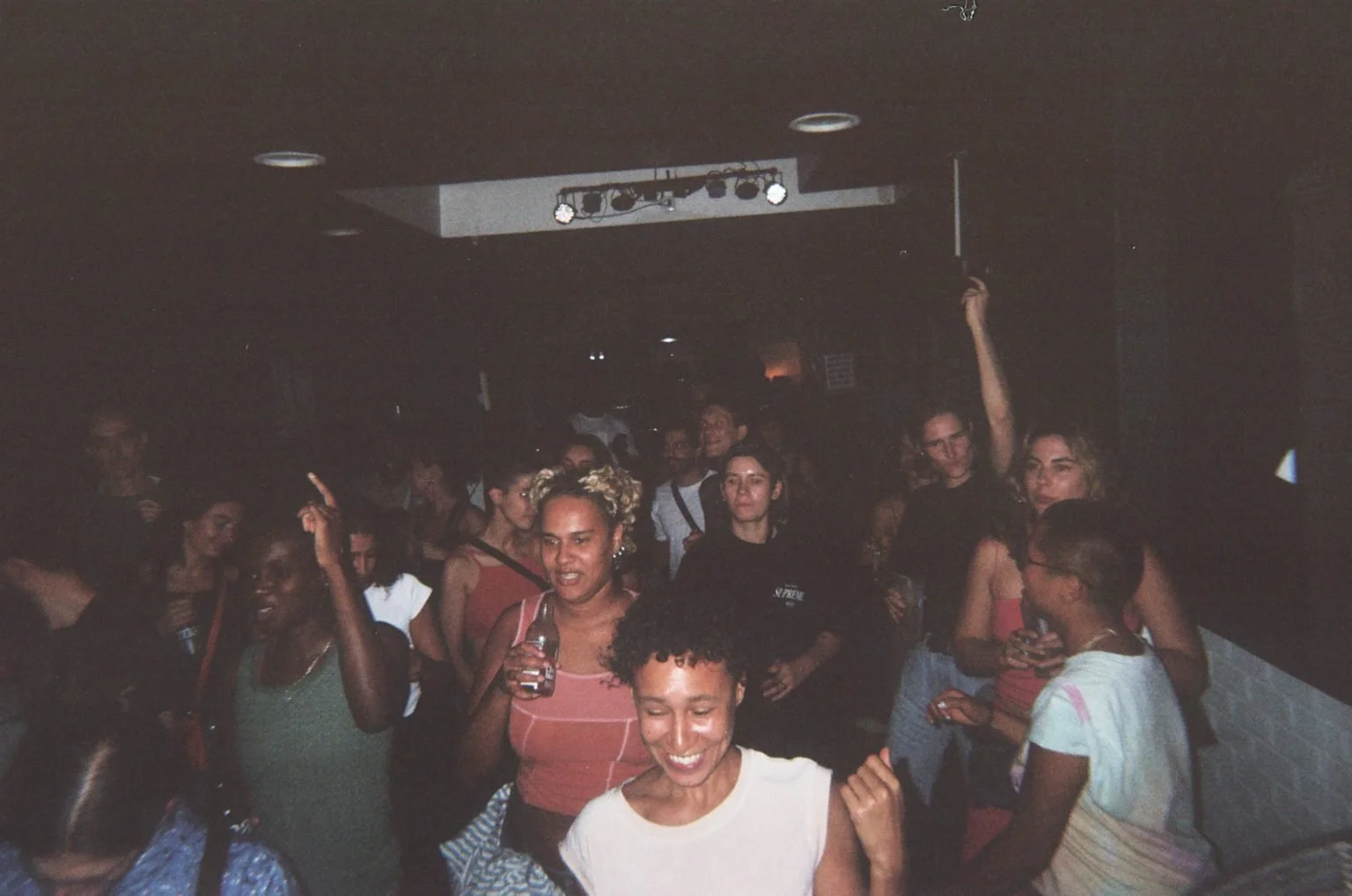Grassroots cultural venues across Europe are facing escalating costs, rising inflation and the long tail of capitalism that demands competitiveness. How about building a business on solidarity? Is that approach financially sustainable? And what would a cooperative economy look like?
I learned a lot while speaking to a handful of arts cooperatives across Europe who are trying to do more than survive. They want to change things. To collectively start a ripple of hope that becomes an international movement.
Each one embodies a potent blend of compassion, resourcefulness, resolve and defiance.
Thanks to Blanka Rákos at Auróra, George Trotter at club coop, Lenny at Sister Midnight and Cliff Mills at Anthony Collins.
Full disclosure: I am a board member at Sister Midnight. Rather than confirming my bias, this means I have seen firsthand how their/our words quickly become actions.
Cooperation over commerce
Christopher Reeve's second act
Impersonating a superhero for a living is a tough gig. Sure, you are idolised and in demand when you capture the imagination. But in Hollywood, a dream role can become a poisoned chalice in the flash of a cape. You become typecast and the inevitable descent begins. What then? Where to, next? How do waning attention and the whims of showbusiness impact how you see yourself – as an actor and a human being?
This was the tangent of Christopher Reeve’s remarkable story that I was most interested in. “There is something about America that is short on heroes,” he concedes in the opening few minutes. “We need as many as we can.” In the next breath, he insists, “I am not a hero. Never have been, never will be,” drawing a clear line between himself and the Man of Steel.
A vivacious, active guy who loved to ride horses, ski and play football among other things, he “went from participant to observer at 42” after a horrific fall in 1995 left him paralysed from the neck down. He flatlined twice and could not breathe on his own. His mother wanted to turn off life support.
Read more on my Substack, Bluejeans & Moonbeams.
Good faith conversations
Earlier this month, I had the pleasure of attending the first live recording of podcast Over The Top Under The Radar, a plucky upstart in the arena of news and politics. It’s hosted by veteran journalist Gary Younge (who influenced my career path) and communications specialist Carys Afoko.
If you lean towards awareness over apathy – and share a distaste for disinformation – then shows like this should be on your radar. It’s hard to find discussions that quickly get to key issues in a way that’s incisive and humanistic rather than dry and condescending.
The dynamic between Gary and Carys is much like a chinwag between workmates from different generations. There is mutual respect, insight, introspection, silliness and freedom to digress. All that in around 30 minutes every week.
Gary does a lot of the heavy lifting when it comes to political analysis, as you would expect from someone who used to be the Guardian’s US correspondent and then editor-at-large. But Carys is no slouch in this area and, besides being the chief purveyor of pop cultural vibes, is particularly good at the Under the Radar element of the show.
One impassioned tirade that really impressed me was an underreported story about contaminated water that we should all be seething at in the UK. They also have a thriving Whatsapp group (for Patreon members only) and regularly answer reader letters about anything from the challenges facing political Muslims to that critical tea-time debate – cream vs jam.
They are securing decent access to notable figures who have stirred the pot, including MP Faiza Shaheen, who was removed as the Labour candidate for Chingford & Woodford Green for tweeting about Islamaphobia in the Labour party. Islington MP and Labour party pariah Jeremy Corbyn. And Reni Eddo-Lodge who wrote the polemical Why I’m No Longer Taking To White People About Race.
At London Podcast Festival, in front of a warm and engaged audience, Gary and Carys ran through their take on the news cycle. There was criticism of the media for grasping too late at flashpoints such as the Grenfell tragedy and this summer’s riots, instead of doing the deep investigation and scrutinising root causes instead of symptoms. Though Gary did attribute part of this to the decline of local journalism.
We also laughed at the OTT reaction to Oasis’ return and Carys was right to point out the prevalence of dynamic pricing long before it became a criticism of the band’s ethics. One person who spent four hours trying to get tickets through multiple accounts while on holiday was special guest Zarah Sultana (listen here). The independent MP, suspended by Labour for backing an amendment to remove the two-child cap on child benefits, was as passionate and defiant a voice in person as I had seen on screen.
For daring to question on Good Morning Britain the inflammatory language used by right-wing politicians and press in regards to Muslims and migrants, she was ganged up on by the panel and later subjected to Islamophobic abuse herself (tread carefully in these comments). And not for the first time. “Demonisation” seemed more palatable a word to Ed Balls and Kate Garraway when uttered by former Conservative co-chair Baroness Warsi.
Astounding how so many people seem unable to hold two ideas in their heads at once: that controlled immigration should be debated in the UK and that islamophobia does exist. What’s coming down the line in terms of Britain’s unresolved tension between xenophobia and unchecked dependency migration was described as a reckoning by Carys.
Labour’s tactic of equivocating on the topic, so as not to alienate right-leaning members of the electorate, has created a vacuum in which Farage & co will make hay. Sooner or later, Starmer & co will have to show their cards.
But back to Zarah who was moved to tears when explaining how she was able to stand up to the constant criticism and abuse. Her passion for politics at a grassroots level, spending more time out and about in her constituency than fielding foolishness in Westminster, and holding truth to power really came through.
When an 18 year old, who is about to study law at university, asked her where she should start her path in politics, Zarah simply urged her to find the issues she cares most deeply about and her people. I passed that advice on to my mentee.
This impetus to join forces and change things, the quest for hope, came through very strongly towards the end of the evening. Let’s be honest, the latter has been in short supply over the past few years, even after a change of government. Gary offered a simple reminder: that Martin Luther King, in his campaign for a revolution in US civil rights, did not say ‘I have a ten-point plan’. It was pursuing the dream that sparked change.
Also, Gary asked us to take another look at this panel, which certainly would not have existed 30 years ago. So I left the building in a better place than I entered it. Encouraged by the fact that the podcast is growing steadily and that we can gather for good-faith conversations like this. There will be tougher ones ahead. Jagged voices of dissent steering the debate, which I hope the hosts take on.
However, one enduring concern is around disaffection with politics and the failure of our democratic process. I live in Lewisham and this March, Brenda Dacres won the by-election with 51.5% of the vote. But get this: the turnout was a feeble 20.74%. At the general election, 59.7% came to vote (58.4% in London), which was the lowest percentage since 2001.
Despite repeated messages that the vote that will most impact your daily life is local not general, we are at a precarious moment. There is an overreliance on social media feeds for news and society is at the mercy of insidious algorithms which determine how the mass populus thinks and feels in an instant. The result is greater conflict and polarisation. Nieman Lab published a good piece about this.
“In the U.S. and the U.K., where political polarization has reached high levels in recent years, political ideology was the key factor in explaining differences in algorithmic knowledge, with liberals having a better understanding of social media algorithms than conservatives.”
A different view
45, more life 💪🏾
A little dispatch after returning from Mallorca, baggy-eyed but still basking in the glow of a magical wedding up in the hills of Deià. Congratulations to the chicest, Vic and Pete. It’s too soon to go through all the images. Running on random access memories for now but here’s a taste of the trip.
For all the struggles of this year, especially the dread of being in work wilderness and longing to feel closer to the centre of something, I must give thanks for privileges like this. Grab them while I can, if even you feel undeserving.
Seeing two people I admire celebrate their union among a warm-hearted and fun-loving bunch from several corners of the world – in such an exquisite and generous manner, and despite a few stern challenges – brings the potential joy in life into sharper focus.
Read more in Bluejeans & Moonbeams.
Also in this issue:
Lonnie Holley’s All Rendered Truth
Good advice for young journalists
A flaw in American Fiction
Mississippi Masala (black + brown love = complicated
Who cares about men’s personal essays?
Have you got male?
A few months ago, I considered the value of the personal essay in the age of oversharing and endless content. “Can you connect the personal to something more universal in a way that tells a larger story about these times?” I asked. And can you do it without drifting into solipsism? A common pitfall.
What I wanted to move on to – but felt unqualified to discuss – was how few men appear to practise this form, particularly the straight ones who talk about dating and relationships. (Am I wrong? Send recommendations, please.)
Is it because many of us are still incapable of articulating, in detail, our emotions about love and self-worth? Or we are unwilling to open ourselves up to judgment in revealing our flaws and fears? Maybe. Ladies often talk about “the work” that many guys would rather not do on themselves.
Some guys may anticipate a harsh reception in a world that is railing against years of patriarchy, a system that “rewards men for being out of touch with their feelings,’ as bell hooks wrote in The Will To Change. A seminal text from 2004 that still cuts through on such matters.
Look beyond the life coaches, influencers and experts who are prominent in conversations of this nature. Imagine someone who is a little less sure of themselves, who is beginning to confront uncomfortable truths and who aspires to write with greater sensitivity or self-awareness. How easy would it be for them to tackle the subject of sex or dating and evade criticism for either bragging or whinging?
Read more in Bluejeans & Moonbeams.
Also in this issue:
Going solo in Porto 🛫
The anatomy of a knockout
Swipe left for lousy grammar
Lola Olufemi’s strategies for resistance
A soul-crushing Apple ad,
Letter to a younger writer







